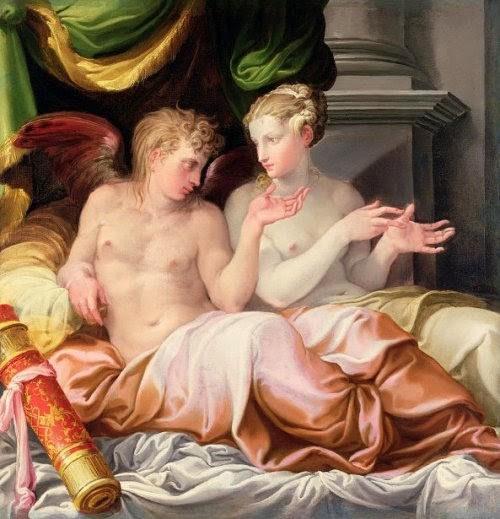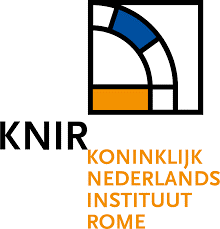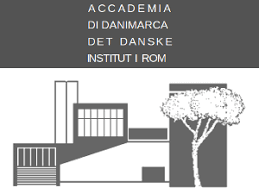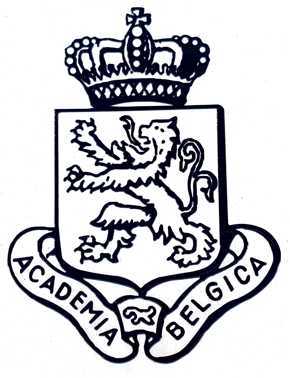SYMPOSIUM: Practices of Privacy: Vestiges of Dialogue and its Places

Niccolò dell’Abate, Eros and Psyche, 1552-71, Detroit Institute of Arts
Practices of Privacy Symposium: Vestiges of Dialogue and Its Places
Dialogue has always been the backbone of knowledge. The Greeks and Romans used dialogue and banter as tools for philosophical explorations. During the early modern period, dialogue was employed to communicate and kindle knowledge. Leonardo da Vinci’s conversational efforts during his lifetime (1452–1519) were disregarded by other scientists because he essentially lacked the official credentials of formal education. In 1659, John Evelyn wrote to his colleague Robert Boyle about his vision for the ideal institution for the exploration of natural knowledge. He described a place where intellectuals could observe and discuss natural phenomena. Beyond the material needs for research, it should include a routine of shared meals and designated conversation hours. But sometimes dialogues about knowledge did not obtain the desired results.
Early modern sources frequently use the dialogue format as a vehicle to spread knowledge. Think, for instance, of artistic or scientific manuals or exchanges between correspondents of the Republic of Letters. Dialogues of knowledge are frequently connected to places, such as artists’ discussions in cafés or salons, humanist discussions in academies, academic debates in universities, or oral transmission of knowledge between masters and apprentices of all kinds, from printers to metalworkers. Knowledge, therefore, depends on conversations located in places to be created, transformed, and disseminated, but the social mores and physical boundaries of the places where these dialogues occur shape which aspects of the created knowledge are shared or kept private and how they are altered during transmission.
Where can we find privacy in dialogue, and what do we mean by privacy? Derived from the Latin privatus, privacy is an elusive concept that has been defined in many different ways. Broadly, we understand privacy as “a human phenomenon that is to do with experiences of withdrawal, boundary drawing, and control of access” (Birkedal Bruun, 2021). As such, we resist any simple definition and rather seek to explore the meaning of expressions of this phenomenon for different people in different cultures and times. What makes a conversation private may have to do with practical, personal, professional or religious needs or desires of the interlocutors, the place where it takes place, or cultural norms, values and practices.
Following up the 2020 event Practices of Privacy: Knowledge in the Making, which launched the “Practices of Privacy” symposia, the 2022 edition will explore how dialogue can be a mediator for the development of ideas in all kinds of areas of human interest during the early modern period (c. 1400–1800).
This hybrid symposium forms part of the Symposium Academiae Belgicae, and will be held over three days from 30 November until 2 December 2022. Presential sessions will take place in Rome at three venues: the Academia Belgica, Royal Netherlands Institute in Rome, and the Danish Academy. Online participation will also be possible. The symposium is organized by fellows, affiliated scholars and colleagues of the Centre for Privacy Studies at the University of Copenhagen.
To register for participation, fill in this form.
PROGRAMME
DAY 1: NOVEMBER 30
A part of the Symposium Academiae Belgicae
Academia Belgica
Via Omero, 8
09:30 Registration
10:00 Welcoming Remarks
Natália da Silva Perez, Centre for Privacy Studies, University of Copenhagen
10:15 Introduction to the Centre for Privacy Studies
Natacha Klein Käfer, Centre for Privacy Studies, University of Copenhagen
11:15 Coffee break
First Keynote (Chair: Annemie Leemans)
11:35 Debating with Others in Solitude: Leonardo’s Use of His Notebooks as Interlocutors
Michael Kwakkelstein, Netherlands Interuniversity Institute for Art History, Florence
12:20 Questions
12:40 Lunch
Panel: Dialogue within the Self (Chair: Liam Benison)
14:30 Leonardo and the Written Dialogue: A Monologic Discourse
Annemie Leemans, University of Antwerp
14:55 Inner Dialogue in English Renaissance Prose Fiction
Vanessa Lim, Seoul National University
15:20 Questions
15:40 Coffee break
Panel: Beyond Artistic Production (Chair: Oskar Jacek Rojewski)
16:00 Dialectics of Inclusion in Lady Drury’s Closet
Lorenz Hindrichsen, Copenhagen International School
16:25 Patria, Parentes et Amici: Otto Vaenius’ Family Portrait and Album Amicorum as Spaces
for Privacy and Dialogue
Tine L. Meganck and Astrid Julia Luypart, Vrije Universiteit Brussel
16:50 Questions
17:00 Close
DAY 2: DECEMBER 1
Royal Netherlands Institute in Rome (KNIR)
Via Omero, 10/12
10:00 Tour of the library of the Royal Netherlands Institute in Rome
Janet Mente, Librarian, KNIR
Panel: Poetics and Dialogue (Chair: Natacha Klein Kafer)
10:30 Tenant to a Rich Lord: The Poetics of Privacy in George Herbert
Angana Moitra, O.P. Jindal Global University, Sonipat, India
10:55 Intra Locum Secretum: Privacy, Withdrawal and Desire in Dionysius the Carthusian’s
Pastoral Dialogues
Thor-Oona Pignarre-Altermatt, European University Institute, Florence
11:20 Questions
11:40 Coffee break
Panel: Medical Dialogues (Chair: Matthijs Jonker, KNIR)
12:00 Body and Privacy: Divulging Secret Knowledge about the Popes’ Health and Death in the Early Modern Avvisi di Roma
Christine Jeanneret, Centre for Privacy Studies, University of Copenhagen
12:25 Healing Dialogue: Controversial Healing Prayers in August of Saxony’s Private Manuscript Natacha Klein Käfer, Centre for Privacy Studies, University of Copenhagen
12:50 Questions
13:10 Lunch
Panel: Correspondence and Dialogue (Chair: Jelena Bakić)
15:00 Letters of Knowledge: The Reform of the University of Coimbra of 1772 in the
Correspondence of Its Reformers
Carlos Fernando Teixeira Alves, Catholic University of Portugal
15:25 Dialogue in the Private Correspondence of Marie-Antoinette
Sabine Hillen, Vrije Universiteit Brussel
15:50 Questions
16:10 Coffee break
Second Keynote (Chair: Liam Benison)
16:30 The Private Character of the Doctor-Patient Relationship: A Case Study of Andreas Vesalius
Bob Van Hee, University of Antwerp
17:15 Questions
17:30 Close
DAY 3: DECEMBER 2
The Danish Institute in Rome
Via Omero, 18
Panel: Women’s Dialogues (Chair: Angana Moitra)
10:00 Privacy, Paratext and the Female Voice in the Italian Renaissance Dialogue
Jelena Bakić, University of Porto
10:25 Lady Lumley’s Prefatory Letters to Her Father
Natália da Silva Perez, Centre for Privacy Studies, University of Copenhagen
10:50 Questions
11:10 Coffee break
Panel: Gardens and Utopias for Dialogue (Chair: Natália Silva da Perez)
11:30 Between Confidentiality and Liberty in the Gardens of Gentlemen and Cardinals of the Sixteenth- and Seventeenth-Century Pontifical Court: The Sacred Wood, the Secret Garden, the Esoteric Way
Carla Benocci, Comune di Roma
11:55 Portals to Early Modern Privacy through Utopian Dialogues
Liam Benison, University of Porto
12:20 Questions
12:40 Closing Session
Natacha Klein Käfer, Centre for Privacy Studies, University of Copenhagen
13:00 Tour of the institute
Charlotte Bundgaard, Director, The Danish Institute in Rome
Organizers: Annemie D.G. Leemans (University of Antwerp), Jelena Bakić (University of Porto), Liam Benison (University of Porto), Natacha Klein Käfer (University of Copenhagen), Oskar Jacek Rojewski (University Rey Juan Carlos), Pieter Martens (Free University Brussels) and Jessica Roitman (Free University Amsterdam).
 |
|
 |
 |
|

